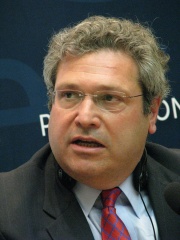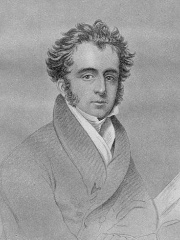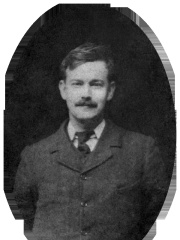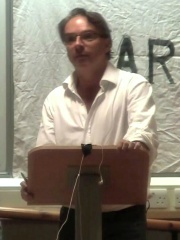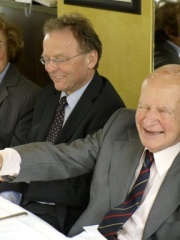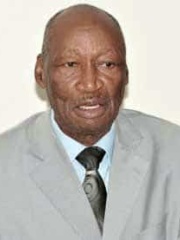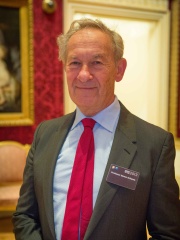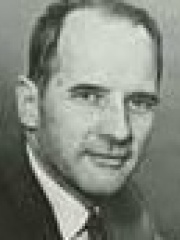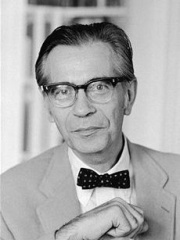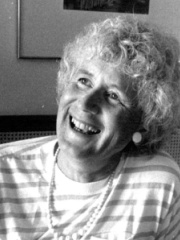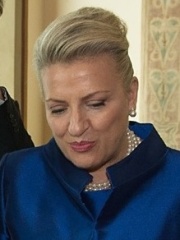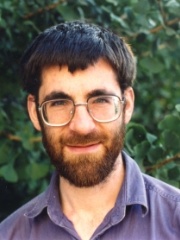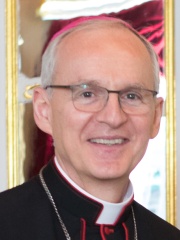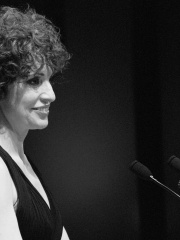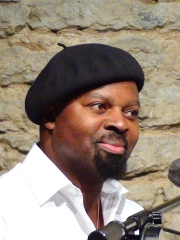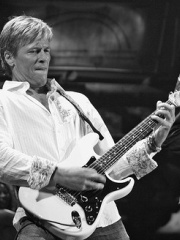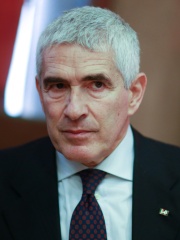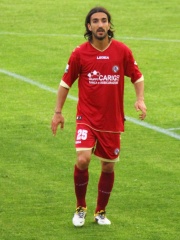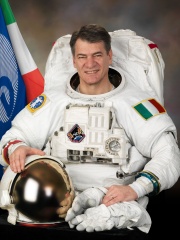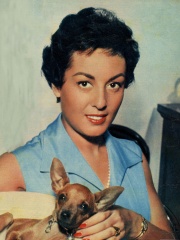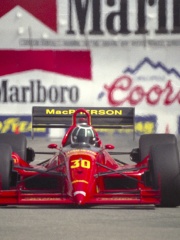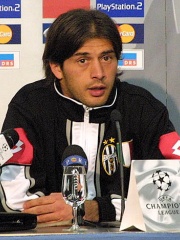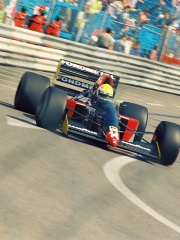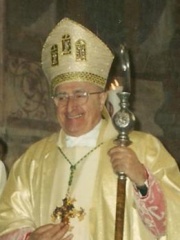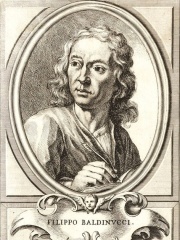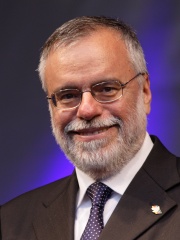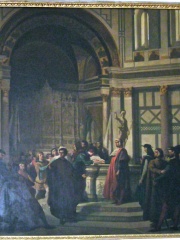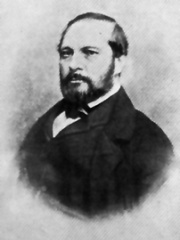Historian
Alessandro Barbero
1959 - today
EN.WIKIPEDIA PAGE VIEWS (PV)
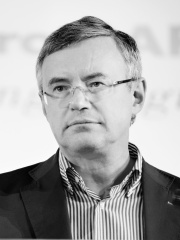
 Alessandro Barbero
Alessandro Barbero
Alessandro Barbero (born 30 April 1959) is an Italian historian and writer, especially essayist. Barbero was born in Turin, Italy. He attended the University of Turin, where he studied literature and Medieval history. He won the 1996 Strega Prize, Italy's most distinguished literary award, for Bella vita e guerre altrui di Mr. Read more on Wikipedia
His biography is available in 17 different languages on Wikipedia (up from 16 in 2024). Alessandro Barbero is the 519th most popular historian (down from 500th in 2024), the 4,125th most popular biography from Italy (down from 3,960th in 2019) and the 27th most popular Italian Historian.
Memorability Metrics
Page views of Alessandro Barbero by language
Among Historians
Among historians, Alessandro Barbero ranks 519 out of 561. Before him are Hugh N. Kennedy, Robert Kagan, George Grote, R. H. Tawney, Orlando Figes, and Andreas Maislinger. After him are Horace Engdahl, Djibril Tamsir Niane, Simon Schama, Carroll Quigley, Richard Hofstadter, and Jan Morris.
Most Popular Historians in Wikipedia
Go to all RankingsHugh N. Kennedy
1947 - Present
HPI: 52.62
Rank: 513
Robert Kagan
1958 - Present
HPI: 52.60
Rank: 514
George Grote
1794 - 1871
HPI: 52.56
Rank: 515
R. H. Tawney
1880 - 1962
HPI: 52.46
Rank: 516
Orlando Figes
1959 - Present
HPI: 52.40
Rank: 517
Andreas Maislinger
1955 - Present
HPI: 52.38
Rank: 518
Alessandro Barbero
1959 - Present
HPI: 52.33
Rank: 519
Horace Engdahl
1948 - Present
HPI: 52.11
Rank: 520
Djibril Tamsir Niane
1932 - 2021
HPI: 52.07
Rank: 521
Simon Schama
1945 - Present
HPI: 52.07
Rank: 522
Carroll Quigley
1910 - 1977
HPI: 52.05
Rank: 523
Richard Hofstadter
1916 - 1970
HPI: 51.79
Rank: 524
Jan Morris
1926 - 2020
HPI: 51.74
Rank: 525
Contemporaries
Among people born in 1959, Alessandro Barbero ranks 439. Before him are Alessandro Andrei, Orlando Figes, Andrzej Buncol, Valeria Ciavatta, Rob Gonsalves, and Richard Borcherds. After him are Petar Rajič, Adriana Ozores, Juan Barbas, Ben Okri, Jack Wagner, and Wendy Smith-Sly.
Others Born in 1959
Go to all RankingsAlessandro Andrei
ATHLETE
1959 - Present
HPI: 52.41
Rank: 433
Orlando Figes
HISTORIAN
1959 - Present
HPI: 52.40
Rank: 434
Andrzej Buncol
SOCCER PLAYER
1959 - Present
HPI: 52.40
Rank: 435
Valeria Ciavatta
POLITICIAN
1959 - Present
HPI: 52.38
Rank: 436
Rob Gonsalves
PAINTER
1959 - 2017
HPI: 52.38
Rank: 437
Richard Borcherds
MATHEMATICIAN
1959 - Present
HPI: 52.34
Rank: 438
Alessandro Barbero
HISTORIAN
1959 - Present
HPI: 52.33
Rank: 439
Petar Rajič
RELIGIOUS FIGURE
1959 - Present
HPI: 52.30
Rank: 440
Adriana Ozores
ACTOR
1959 - Present
HPI: 52.25
Rank: 441
Juan Barbas
SOCCER PLAYER
1959 - Present
HPI: 52.24
Rank: 442
Ben Okri
WRITER
1959 - Present
HPI: 52.23
Rank: 443
Jack Wagner
ACTOR
1959 - Present
HPI: 52.20
Rank: 444
Wendy Smith-Sly
ATHLETE
1959 - Present
HPI: 52.20
Rank: 445
In Italy
Among people born in Italy, Alessandro Barbero ranks 4,126 out of NaN. Before him are Roberto Vittori (1964), Ivo Stefanoni (1936), Pier Ferdinando Casini (1955), Piermario Morosini (1986), Paolo Nespoli (1957), and Bianca Maria Piccinino (1924). After him are Fabrizio Barbazza (1963), Mark Iuliano (1973), Dave Rodgers (1963), Alessio Tacchinardi (1975), Andrea Chiesa (1964), and Paolo Magnani (1926).
Others born in Italy
Go to all RankingsRoberto Vittori
ASTRONAUT
1964 - Present
HPI: 52.38
Rank: 4,120
Ivo Stefanoni
ATHLETE
1936 - Present
HPI: 52.37
Rank: 4,121
Pier Ferdinando Casini
POLITICIAN
1955 - Present
HPI: 52.37
Rank: 4,122
Piermario Morosini
SOCCER PLAYER
1986 - 2012
HPI: 52.36
Rank: 4,123
Paolo Nespoli
ASTRONAUT
1957 - Present
HPI: 52.34
Rank: 4,124
Bianca Maria Piccinino
JOURNALIST
1924 - 2025
HPI: 52.33
Rank: 4,125
Alessandro Barbero
HISTORIAN
1959 - Present
HPI: 52.33
Rank: 4,126
Fabrizio Barbazza
RACING DRIVER
1963 - Present
HPI: 52.32
Rank: 4,127
Mark Iuliano
SOCCER PLAYER
1973 - Present
HPI: 52.28
Rank: 4,128
Dave Rodgers
MUSICIAN
1963 - Present
HPI: 52.26
Rank: 4,129
Alessio Tacchinardi
SOCCER PLAYER
1975 - Present
HPI: 52.21
Rank: 4,130
Andrea Chiesa
RACING DRIVER
1964 - Present
HPI: 52.21
Rank: 4,131
Paolo Magnani
RELIGIOUS FIGURE
1926 - 2023
HPI: 52.20
Rank: 4,132
Among Historians In Italy
Among historians born in Italy, Alessandro Barbero ranks 27. Before him are Filippo Baldinucci (1625), Quintus Claudius Quadrigarius (-200), Andrea Riccardi (1950), Dino Compagni (1255), Michele Amari (1806), and Girolamo Mei (1519).
Filippo Baldinucci
1625 - 1697
HPI: 59.04
Rank: 21
Quintus Claudius Quadrigarius
200 BC - 100 BC
HPI: 58.13
Rank: 22
Andrea Riccardi
1950 - Present
HPI: 58.10
Rank: 23
Dino Compagni
1255 - 1324
HPI: 57.67
Rank: 24
Michele Amari
1806 - 1889
HPI: 56.92
Rank: 25
Girolamo Mei
1519 - 1594
HPI: 55.20
Rank: 26
Alessandro Barbero
1959 - Present
HPI: 52.33
Rank: 27

